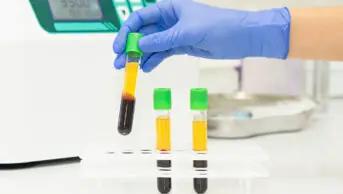
Shutterstock.com
Open access article
The Royal Pharmaceutical Society has made this article free to access in order to help healthcare professionals stay informed about an issue of national importance.
To learn more about coronavirus, please visit: https://www.rpharms.com/resources/pharmacy-guides/wuhan-novel-coronavirus

Source: Shutterstock.com
Findings from the REMAP-CAP trial have indicated that tocilizumab significantly improves outcomes for patients critically ill with COVID-19
A UK-wide position statement to support off-label prescribing and access to tocilizumab, administered intravenously, for eligible COVID-19 patients in intensive care has been published.
The advice follows early positive signals of benefit from the immune modulation therapy domain of the Randomised, Embedded, Multi-factorial, Adaptive Platform Trial for Community-Acquired pneumonia (REMAP-CAP) that indicated that tocilizumab significantly improves outcomes for critically ill patients with severe COVID-19, potentially reducing mortality and time spent in intensive care.
Patients are only eligible for tocilizumab if they have been admitted to ICU with severe pneumonia requiring respiratory support, such as high-flow nasal oxygen, continuous positive airway pressure or non-invasive ventilation, or invasive mechanical ventilation; and with COVID-19 infection that is confirmed by microbiological testing or where staff are confident that COVID-19 is the most likely diagnosis.
In a COVID-19 therapeutic alert, published on 25 November 2020, it was highlighted that NHS acute trusts and health boards had been asked to take “immediate” steps to support the treatment of patients admitted to intensive care with COVID-19.
The first of these steps was for REMAP-CAP trial centres to continue to enrol patients into the study in order to determine the effectiveness of the other immune modulators being tested (sarilumab, anakinra and interferon) relative to tocilizumab.
The alert also says that trusts must confirm whether or not they wish to prescribe tocilizumab, as an off-label product, in the treatment of patients admitted to intensive care with COVID-19 outside of a trial, to ensure that the necessary internal governance arrangements have been completed before the medicine is prescribed. The process by which organisations can register to participate in COVID-19-specific tocilizumab supply arrangements is specific to each country.
Trusts and health boards must also maintain access to intravenous tocilizumab for existing indications, including rheumatoid arthritis and treatment of cytokine storm following CAR-T therapy.
Finally, organisations have been asked to provide regular updates on the stock position of the trust with regional procurement pharmacy leads and chief pharmacists.
According to the alert, tocilizumab should be administered as an intravenous infusion at a dose of 8mg per kg, up to a maximum dose of 800mg. A second infusion may be given after 12–24 hours if, after the initial dose, there has not been sufficient clinical improvement. It also states that no interaction between tocilizumab and either dexamethasone or hydrocortisone is expected.
The interim position statement will be reviewed as further evidence becomes available, including from the REMAP-CAP trial.


